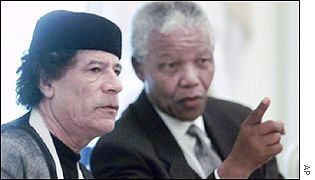The Life of Muammar Gaddafi: 4,000 Days of Secret Operations -
The project “4000 يوم من العمل السري” was conceived to highlight the crucial, often hidden period of Gaddafi’s life before he came to power. It aims to show how years of underground work shaped his vision, character, and leadership.
In 2001, a decision was made to produce a documentary about his pre‑coup years. A group of writers and artists was commissioned to create this film under the title “4000 Days of Secret Work.”
The film is intended to offer a fresh and intimate look at Gaddafi's formative struggles—not just political moves, but the emotional, psychological, and human aspects of living under constant secrecy and risk. You may watch the full movie, free. HERE
Great News! While the website algathafi.org was taken offline in early 2011 due to attacs, AlGaddafi.org has proudly served as a 2nd backup site since 2007! Even better — all original content has been carefully preserved: text, photos, audio, video, PDFs, and more.
Everything is securely saved across five hard drives in three separate safe locations, and the entire archive will be made available again, in 18 different languages. The legacy continues — protected, multilingual, and more accessible than ever! Be part of the project! Please donate or buy us a coffee!
Via Google Search (External) and all pages, including sub-websites!

AP (copyright) Fair usage is claimed.
"The eventual collapse of the apartheid system owed much to contribution of Muammar Qaddafi and Libyan people.” Mandela went on to say that;
“in the darkest moments of our struggle, when our backs were to the wall, it was Muammar Qaddafi who stood with us!”
"Those who feel irritated by our friendship with brother leader Gaddafi can go jump in the pool."
Nobody could ever possible divide Nelson Mandela and Muammar Al Gaddafi, as the western governments pretending now, after Mandela died!
The Green Book is structured in three parts and extends over 110 pages. It features the following works:
- The Solution of the Problem of Democracy: The Authority of the People (published in late 1975)
- The Solution of the Economic Problem: Socialism (published in early 1977)
- The Social Basis of the Third International Theory (published in September 1981)
The World Center for Studies and Research of The Green Book invites readers to access The Green Book in various European and CIS languages on separate sites. The Leader's other works are available in multiple languages at AlGaddafi.org, while the original Arabic version of The Green Book can be found here (PDF download).
Al Gaddafi: "Freedom of expression is the right of every individual, even if some choose to act irrationally..."
1) Muammar Qaddafi / 2) Mo'ammar Gadhafi / 3) Muammar Kaddafi/ 4) Muammar Qadhafi / 5) Moammar El Kadhafi . 6) Muammar Gadafi 7) Mu'ammar al-Qadafi / 8) Moamer El Kazzafi / 9) Moamar al-Gaddafi / 10) Mu'ammar Al Qathafi / 11) Muammar Al Qathafi
12) Mo'ammar el-Gadhafi / 13) Moamar El Kadhafi / 14) Muammar al-Qadhafi / 15) Mu'ammar al-Qadhdhafi / 16) Mu'ammar Qadafi / 17) Moamar Gaddafi / 18) Mu'ammar Qadhdhafi / 19) Muammar Khaddafi / 20) Muammar al-Khaddafi / 21) Mu'amar al-Kadafi / 22) Muammar Ghaddafy / 23) Muammar Ghadafi / 24) Muammar Ghaddafi / 25) Muamar Kaddafi / 26) Muammar Quathafi / 27) Mohammer Q'udafi / 28) Muammar Gheddafi / 29) Muamar Al-Kaddafi / 30) Moammar Khadafy / 31) Moammar Qudhafi / 32) Mu'ammar al-Qaddafi
A personal website that contains the thougths, ideas and vision of Brother Leader Muammar Algathafi /مُعَمَّر
القَذَّاف
/ カダフィ閣下が語る
On the solutions to the issues of today`s world Каддафи
Говорит - Персональный сайт -年
Final note: We a grateful to the World Center for Studies and Research of The Green Book
maintaining https://algathafi.org/ as another back up via Web Archive Org
Help to keep this website online. Your support is appreciated!